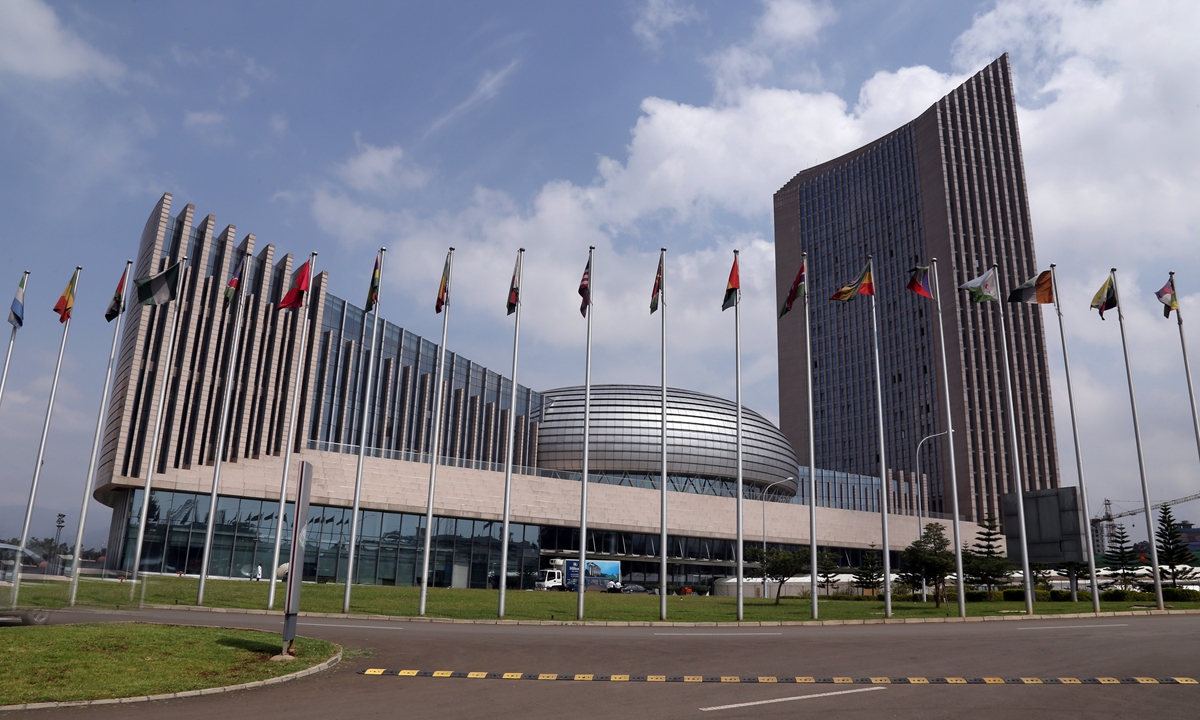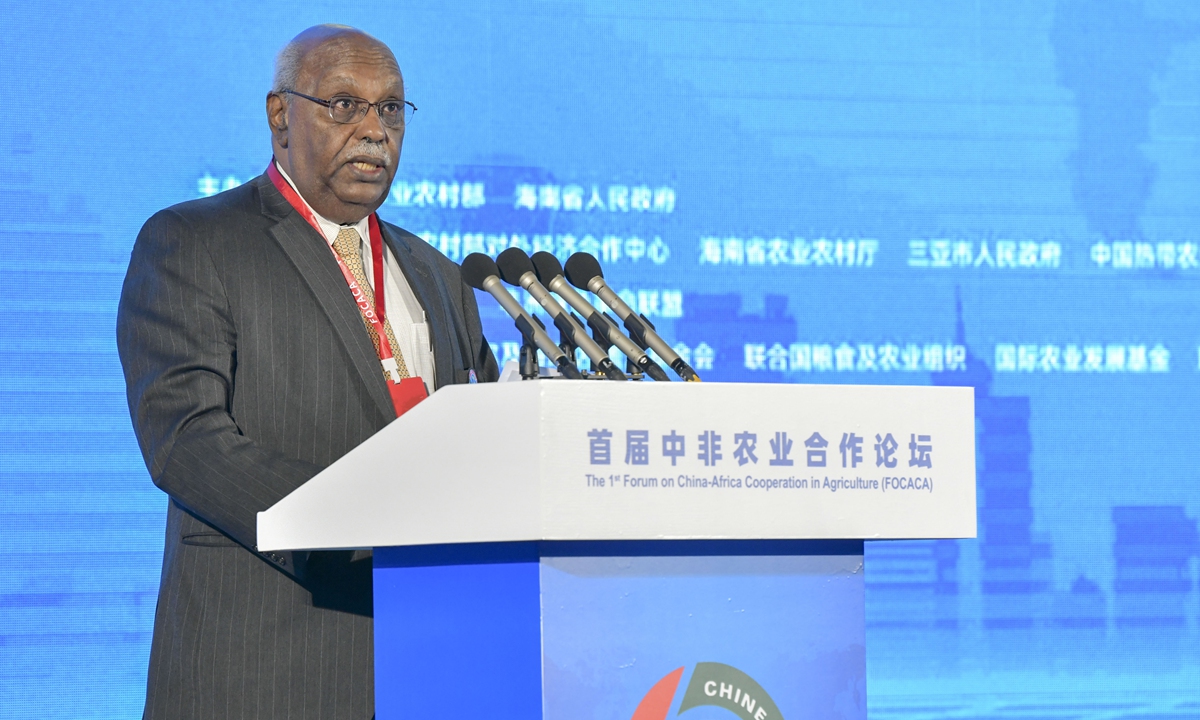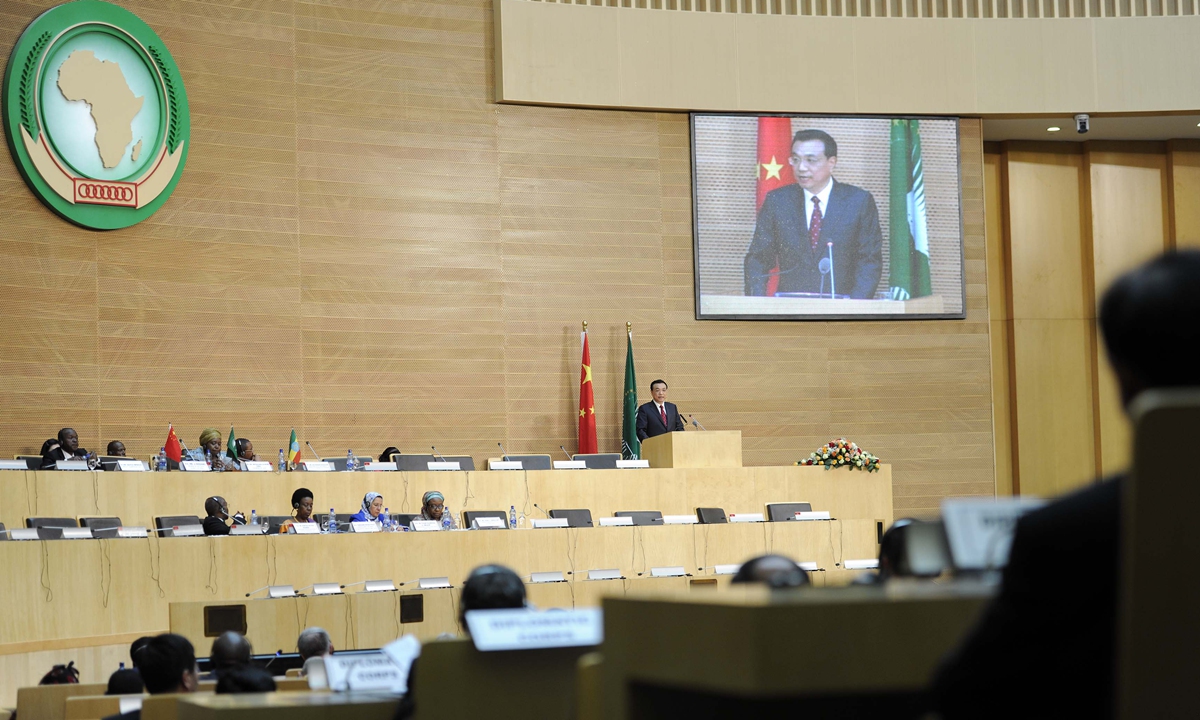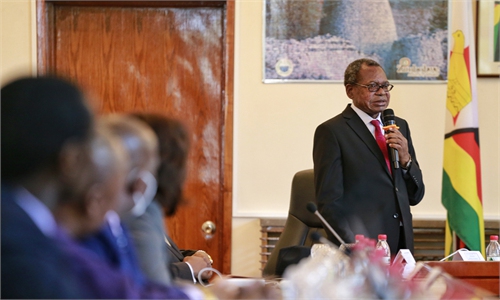IN-DEPTH / DIPLOMATIC CHANNEL
African Union ambassador lauds China’s effort in upholding developing countries’ interest in UN mechanism
Brotherhood league

External view of the African Union Conference Center and Office Complex in Addis Ababa Photo: VCG
Editor's Note:
The 26th Session of the United Nations General Assembly (UNGA) in 1971 overwhelmingly adopted Resolution 2758 and decided to restore the lawful seat of the People's Republic of China (PRC) in the world body. The push to block the resolution by some countries led by the US and Japan failed thanks to China's unremitting efforts and the support from a growing number of newly independent countries in Asia and Africa. It is widely known that developing countries including African brothers "carried us into the UN," which vividly reflects the profound friendship between China and Africa, and how Africa's vote was vital for China's return to the UN. In a recent interview with the Global Times reporter Hu Yuwei (GT), Rahamtalla Osman (Osman), Permanent Representative of the African Union to China, said highly of China's active and creative role in the UN in the past 50 years, and appreciated China for providing sustainable solutions to human wellbeing in health, poverty alleviation, and many other arenas.
GT: How do you view People's Republic of China's return to the UN since 1971? How did African votes contribute to that determination?
Osman: You would recall that in 1971 African countries provided the crucial majority which ensured the joining of The People's Republic of China (PRC) to the United Nations and also allowing it to take its lawful seat on the United Nations Security Council as one of the five permanent members. Since then, an unbreakable bond between China and Africa was forged. This bond has witnessed the leadership of China in supporting African countries in their fight for national independence and liberation against colonialism, apartheid and segregationist regimes which laid a solid foundation for long-term friendship and cooperation.
GT: China has been a strong supporter of the UN. What do you think has been its most prominent contribution over the past 50 years?
Osman: China, as a founding member of the United Nations and the first country to sign the United Nations Charter, has made tangible contributions to the United Nations, especially in global governance, peacekeeping, and poverty reduction and development.
Over the years, China supported multilateralism and improvement of global governance in international development cooperation, including safeguarding the international system with the United Nations at its core, as China continued to adhere to the universal values of peace, development, equity, justice, democracy, and freedom.
In recent years, China has taken an active role in the United Nations peacekeeping operations. For instance, in December 2018, China's share of the United Nations peacekeeping budget for 2019-2021 was raised from 10.24 percent to 15.22 percent, making it the second largest contributor only after the United States of America. China has dispatched more than 40,000 peacekeepers to over 30 missions, contributing more personnel than any other permanent member of the United Nations Security Council.
China's active role in peacekeeping has a special meaning to Africa since most of the UN's peacekeeping missions currently deployed throughout the world are in Africa.
Moreover, China plays a great role in the reform of the UN Security Council, in particular calling for the increase in representation and role of developing countries in the council to enhance the council's authority and efficiency and enable it to better fulfill the responsibilities of maintaining international peace and security conferred to it by the UN Charter.

Ambassador of the African Union to China Rahamtalla Osman Photo: cnsphoto
GT: In poverty alleviation, climate change, and sustainable development, China has been committed to sharing its successful experience with other developing countries. How is the cooperation viewed by African countries?
Osman: The continued support to Africa at various levels, including the contribution to the peacekeeping missions and the operationalization of the African Standby Force (ASF), as well as the work towards a better representation of Africa in the international system and the United Nations Security Council, continues to be a priority for China.
These developments have also facilitated the strengthening of the partnership between the African Union and the UN, based on the principles of mutual respect and African ownership. In fact, the African Union and the UN are actively implementing joint frameworks on peace and security and sustainable development, including the 2030 Agenda for Sustainable Development and the African Union Agenda 2063. Africa, China and the United Nations are also cooperating on a number of specific situations before the United Nations Security Council.
Ending poverty by 2030 is at the heart of the United Nations' Sustainable Development Goals (SDGs). More recently, China achieved the goal of eliminating absolute poverty 10 years ahead in its plan to realize the goals established under the United Nations 2030 Agenda for Sustainable Development. 99 million rural poor living below the current poverty line were raised from poverty. These achievements have written a new chapter in the world history as China's contribution to the poverty reduction represents more than 70 percent of the global poverty reduction effort, and has significantly reduced the world's impoverished population.
Africa, China and the United Nations are also cooperating on a number of specific situations before the United Nations Security Council.
Ending poverty by 2030 is at the heart of the United Nations' Sustainable Development Goals (SDGs). More recently, China achieved the goal of eliminating absolute poverty 10 years ahead in its plan to realize the goals established under the United Nations 2030 Agenda for Sustainable Development. 99 million rural poor living below the current poverty line were raised from poverty. These achievements have written a new chapter in the world history as China's contribution to the poverty reduction represents more than 70 percent of the global poverty reduction effort, and has significantly reduced the world's impoverished population.
The willingness of China to share the proceeds of its development path with the rest of the developing world toward their economic and social development and people's wellbeing is a great contribution to the global agenda on poverty eradication. As such, an understanding of China's experience of poverty reduction will provide a reference for other countries to fight poverty, particularly those in South Asia and Africa, which have around 85 percent of the world's poor.
Regarding Africa, the government and people of China have shown the world that they are still true partners through support to the continent's commitment to its own path of growth and development. In particular, the commitments made to help Africa in the implementation of the agenda 2063 and the United Nations 2030 Agenda for Sustainable Development will steadily reinforce African capacities to fight against poverty and toward the development of the continent.

Chinese Premier Li Keqiang delivers a speech at the Chinese-built AU Conference Center and Office Complex in Addis Ababa on May 5, 2014. Photo: cnsphoto
GT: Has the effectiveness of the multilateral mechanism of the UN been weakened by the unilateralism from some Western countries? How should China and most countries properly use the UN mechanism to safeguard international order?
Osman: China is at it frontline of the promotion of south-south cooperation specifically through the Forum on China-Africa Cooperation (FOCAC) and the Belt and Road Initiative (BRI), which cover a range of areas such as industrialization, agricultural modernization, infrastructure, finance, green development, trade and investment, poverty reduction, public health, cultural and people-to-people exchanges, and peace and security testify that south-south cooperation can respond to the development needs of our continent.
Equally, in the face of COVID-19, China has actively responded to the UN-led Global Humanitarian Response Plan with a cash donation of $50 million to the World Health Organization, assistance in kind to over 150 countries and international organizations, and medical exports to more than 200 countries and regions.
African nations have also benefited from China's support in the fight against COVID-19 pandemic and in improving their public health systems, fortifying their public health defenses and improving the speed of their response and their capacity for disease control through cooperation mechanisms such as pairing up with African hospitals and the acceleration of construction of health infrastructures in the continent. China has further committed to make COVID-19 vaccines available as a global public good.
As such, I wish to conclude by reiterating that the African Union will remain China's strategic and longstanding partner as we jointly pursue common development goals based on mutual respect, good faith, shared interests, and practical results.
I sincerely hope that the commemoration of the 50th Anniversary of the restoration of the lawful seat of China in the United Nations will provide an opportunity to renew China's commitment with multilateralism, partnership, and cooperation toward world peace, stability, and development.

